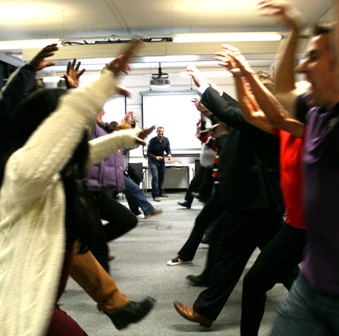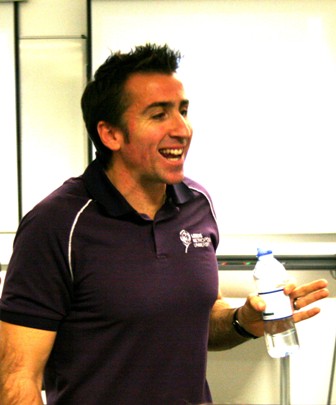Richard Bailey: getting his de-centring sorted with some outside help
Learning through games, with games and from the Games
The latest Coaching Insight took The Leisure Review to the Hertfordshire Sports Village for the sixth annual Hertfordshire coaching conference.
Richard Bailey: getting his de-centring sorted with some outside help
“It’s been quite a year for sport.” With such an opening observation to welcome delegates to the sixth Hertfordshire coaching conference Rob Hardwick was on safe ground but it offered an appropriate starting point for an exploration of the importance of coaching to learning. This unique year for British sport has already had a profound effect on public perceptions of sport, he noted, and it will have a profound impact on participation. However, for all the emphasis upon getting people into sport, Hardwick told his audience of coaches, coach educators and coach managers that there needs to be an equal emphasis on keeping them in. The role of coaches in this context was to understand that people come to sport to have fun, while the role of governing bodies of sport and national sports agencies was to understand that a good coach means that people will come back, and keep coming back, to make sport and physical activity part of their lives.
Dr Richard Bailey, the first speaker on the programme, reinforced this thesis by considering the essential elements and fundamental benefits of a learner-centred approach to coaching. As a sports researcher, lecturer, writer and coach, he works with numerous organisations but his work with the Red Cross/Red Crescent, which involves looking at the role of sport in disaster areas as part of the process of normalising life for people caught up in such disasters, serves to illustrate just how elemental the role of sport can be.
“It’s quite a radical idea,” Bailey said. “Sport is often used as an alternative to rehabilitation but physical activity is one of our normalising activities. Sport can be a profoundly useful way of helping people rebuild their lives.”
Bailey explained that while he is heartened that the regular international conference of national sports ministers includes young people and mega-events on the agenda this positivity is tempered by his knowledge that the people involved and organisations such as Unesco do not really know what they are talking about when it comes to sport.
“We need to be clear about the benefits of sport,” he said, “and we need to choose our metaphors carefully.” He noted that much of the language of health is couched in terms of combat – tackling ill-health, fighting heart disease, for example – but such terms result in a narrow set of outcomes. The World Health Organisation sees health in terms of a positive state of affairs rather than an absence of disease and such a minor recalibration of reference points can, Bailey argued, have a significant effect upon results: “A change of metaphor brings a more positive and progressive approach.”
Putting an image of ducks on the screen, he then explored the concept of de-centring. While trying unsuccessfully to shoo away some ducks during a recent camping trip, Bailey had realised that the answer lay in thinking like a duck, de-centring himself from his own perceptions and assumptions. Where shouting and waving had had little impact on removing the birds from his pitch, a large man standing up – the application of scale on the grounds that if one were a duck a towering figure would be more intimidating than movement or noise – did the trick.
“Most of us forget that the moment we start coaching,” Bailey said. “We’re always surprised when our coaching methods don’t work. Why wouldn’t they work? After all, they worked for us.” But any person coming to sport does so with their own biography, their own experiences and attitudes. For example, studies show that almost everyone who is serious about sport moves between sports, therefore as a coach one cannot assume that beginners know nothing about sport or the sport they are being coached in at the time.
Bailey was adamant that the old canards of coaching need challenging. Putting aside everything that one has learned about coaching from The Karate Kid – and Bailey was adamant that there was nothing for a competent coach to learn from Mr Miyagi – he explained that there are three pillars of performance excellence: deliberate practice, mind set and real learning. For the first, practice, it has recently become a truism, thanks largely to Malcolm Gladwell, that one needs 10,000 hours of practice to become an expert in any particular skill. However, professional golfers are often found to need much more time than that while reaching the elite in skeleton bobsleigh can require much less; deliberate practice is the key. Mind set, as demonstrated by the swift progression of the Australian women’s bob team from novices to world leaders in 18 months, is also essential, with a growth mindset – an approach that is able to see defeat as part of the learning process – particularly advantageous. The key to performance also requires real learning, a process that is all about context. Real learning, Bailey argued, is about problem-solving and without the context of the situation in which one is preparing to perform learning does not occur. “Too much coaching,” he said, “provides the solution before the player has encountered the problem.”
Dan Fox and Matt Lent provided another approach to learning in the next session. As leading practitioners in the field of game-based training, and the application of game mechanics, they explored how to use games to ensure a coach’s performers are engaged, focused and retain the learning that the coach is offering. The opener was about collaboration, finding commonality among pairs of people, then fours, then eights and finally the whole group. But what makes a game and what makes people want to play? There are, Fox and Lent, suggested four components. First, there has to be a goal of some kind. Second, a game needs barriers or obstacles to overcome. Third, there has to be some form of feedback, perhaps in the guise of points. Finally, it has to be voluntary.
They demonstrated some of the finer points of game theory by taking everyone through a series of games of rock-paper-scissors, the game of chance and hand signals familiar to almost everyone as a quick solution to minor disputes. Despite its simplicity, Fox and Lent explained that rock-paper-scissors demonstrates game theory so well because it has a number of strategic quirks, which a few rounds between paired delegates began to demonstrate. Moving the game on to wizards-giants-goblins, a super-sized, team version of rock-paper-scissors with different powers and appropriately grand gestures to indicate each group’s selection, Fox and Lent were able to demonstrate the importance of what they termed ‘confirmation’, the process of gaining knowledge upon which your strategy can be based. A few rounds of wizards-giants-goblins and everyone was making better-informed and more strategic decisions before they leapt into their chosen poses.
With everyone in a circle, a game involving throwing and catching various objects demonstrated the importance of collaborative roles. Throwing and catching one object proved relatively simple but adding more objects to follow and more rules about from whom one is receiving and to whom one can throw showed how team members need to enable others to do their jobs if the whole is to be successful. With balls, bean bags, warnings and requests flying through the air, the point was noisily driven home.
The final session saw Sergio Lara-Bercial, the senior research officer for the Global Coaching Office based at Leeds Metropolitan University and technical offer to the International Council for Coaching Excellence (ICCE), offer an insight to his time spent during the Olympics at the Global Coaches’ House where he found himself rubbing shoulders with the world’s best. The Coaches’ House provided three weeks of intense debate, interaction and analysis, which Lara-Bercial likened to a rolling three-week conference on coaching with the delegate list changing hour by hour. There were 50-plus presentations during this time and more than 450 of the world’s coaches visited to say hello and engage in conversation.
The ICCE also used the occasion of the Olympic Games to launch the International Coaching Framework, a document that provides common ground for developing and evaluating coaching qualifications, encouraging coach education and training, working across international boundaries and establishing ethical guidelines and standards of practice. The process involved looking at the core functions of the coach and established these as: setting the vision and strategy; shaping the environment; building relationships; conducting practices and structuring competitions, reading and reacting to the field; learning and reflecting.
Having interviewed numerous top-level coaches for an ongoing project, the Serial Winners coach programme, Lara-Bercial was also keen to offer a seventh area for the successful coach to master: looking after themselves. Too many coaches who had reached the pinnacle of their profession in their particular environments told tales of ill-health and broken relationships brought about by their striving for excellence for themselves as coaches and for the teams with which they worked. These were, Lara-Bercial noted, salutary tales of supposed success.
Coaches love an aphorism and much of Lara-Bercial’s presentation used pithy quotes either from the Global Coaches House or from his Serial Winners interviews to spark discussion. One of the former, from Dr Sue Smith, summed up the morning: “Coaches need to develop their identity as learners.” Three hours, three speakers and thirty coaches later, it was clear that if we can learn from Bailey’s ducks we can teach far more effectively.
Find out more about the Coaching Insight series and download the available presentations.
To discover more about the work of The Games Trainers visit www.thegametrainers.com
The Leisure Review, November 2012
© Copyright of all material on this site is retained by The Leisure Review or the individual contributors where stated. Contact The Leisure Review for details.
Download a pdf version of this article for printing

